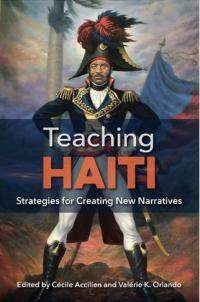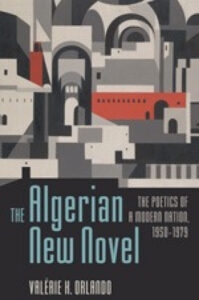Valérie K. Orlando

School of Languages, Literatures, and Cultures
Professor & Program Head, French
Professor, Cinema and Media Studies
Affiliate Faculty, Latin American and Caribbean Studies Center
3106C Jiménez Hall
Get Directions
Education
Ph.D., French and Francophone Literatures, Brown University
Research Expertise
20th Century
21st Century
African Diaspora
Afro-Caribbean Studies
Film Studies and Cultural Studies
French and Francophone Studies
Valérie K. Orlando is Professor of French & Francophone Literatures at the University of Maryland, College Park. She has been nominated Affiliate Faculty to the Honors College for AY2025-26. She was the recipient of the Distinguished Scholar-Teacher Award AY2023-24. She has been awarded a National Endowment for the Humanities Summer Stipend Grant for 2024. She is also the recipient of the Fulbright-Tocqueville Distinguished Chair Award (Université de Lyon-Lumière II, Lyon, France, fall 2019), and was Research Fellow at the Collegium de Lyon (L’institut d’études avancées de l’université de Lyon, spring 2020). She is the author of six books, the most recent of which include: The Algerian New Novel: The Poetics of a Modern Nation, 1950-1979 (2017), New African Cinema (2017), and Screening Morocco: Contemporary Film in a Changing Society (2011). She has published with Cécile Accilien Teaching Haiti: Strategies for Creating New Narratives (2021), with Pamela Pears, Paris and the Marginalized Author: Treachery, Alienation, Queerness, and Exile (2018) and with Sandra M. Cypess, Reimaging the Caribbean: Conversations among the Creole, English, French and Spanish Caribbean (2014). She publishes articles in French and English on a wide variety of subjects in the areas of Literary Studies, Women’s Studies, African Cinema, and French and Francophone Studies, specifically focusing on Africa and the Caribbean. Since 2004, she has worked as Series Editor for After the Empire: The Francophone World and Postcolonial France with Lexington Books.
Courses
Université Lumière Lyon II, Lyon, France (fall 2019)
4DLMB101 : La littérature et le cinéma féminin du Maghreb: « Ecritures féminines » des voix insoumises (Masters II Level), (taught in French)
University of Maryland, 2006-present
Undergraduate courses
FREN242: Francophone Writers of Africa and the African Diaspora in Translation (taught in English)
FREN243: Masterpieces in French and Francophone Cinema (taught in English)
FREN301: Style et Composition (taught in French)
FREN313: Le monde francophone (taught in French)
FREN387: Critical Writing on France and the French-Speaking World: “Detective Fiction, Crime Novels and Film Noir in France and the French-Speaking World” (taught in French)
FREN404: “Beur & Banlieue Literature & Cinema in Contemporary France” (taught in French in Nice, France, Maryland-in-Nice Program)
FREN421/FILM421: African “Francophone Film”, from 1960 to the present (taught in English)
FREN488a: “Imaginary and Memory in the Reality of Francophone African Film from 1960 to the present” (taught in English)
FREN488b: Topics in Francophone Literature (Taught in French)
FREN488v: Francophone Literature and Film (Taught in French)
FREN498G: Gender and Identity in Film and Literature of the French-Speaking World (Taught in French)
499D: « Du réel au surréaliste : La France au 20e-21e siècle en littérature et cinéma : guerre, révolution, imagination et transformation » (taught in French)
FREN 499P: Les Classiques du polar et du film noir: En France et le monde francophone (taught in French)
HHUM105: “Introduction to the Humanities” (taught in English to Honors Humanities students)
HONR299Z : “Contemporary Voices of Africa and the Caribbean in Film and Text” (Taught in English, Spring 2021)
HONR349K—Global Experience in Morocco (Spring 2011)
Graduate Seminars (MA & PhD)
FREN600 : Literary History, Theories, and Methodologies for French and Francophone Studies (taught in French)
FREN699A: La folie dans la littérature des femmes de l’Afrique et des Caraïbes (taught in French)
FREN699B : Théories, Philosophies et Textes Révolutionnaires du Monde Francophone (taught in French)
FREN699G : La littérature et le cinéma féminin du Maghreb: « Ecritures féminines » des voix insoumises
FREN699J : L’Influence du Nouveau Roman sur les écrivains du Maghreb, 1948-1968 (taught in French)
FREN699M : Rage, Folie, Guerre et Amour dans la littérature des femmes du monde francophone (taught in French)
FREN699M/SPAN780 Writing H(er)stories: Murder, Madness and Texts of Transgression by Women Writers of the Caribbean (French & Spanish Graduate Seminar, team-taught in English, Spring 2011)
FREN699O: Autour du roman algérien: 1900 aux années 2000 (taught in French)
FREN699Q : Du surréel au réel : études de fiction française des 20e et 21e siècles (taught in French)
FREN699V: Une Histoire littéraire des Caraïbes francophones: A Literary History of Francophone Islands in the Caribbean (taught in French)
FREN899: Independent Study on Literature of the Mashreq with a PhD student
FREN899: Independent Study on Canadian Literatures in French with a PhD student
LLC698E Special Topics in Interdisciplinary Studies: Haiti: Literature and Ideology; (1 credit Graduate Seminar)
SLLC698W Graduate Writing and Time Management; (1 credit Graduate Seminar, co-taught, Spring 2016)
Publications
Le cinéma algérien des années 2000 : Violence de la Révolution et de la guerre civile, ou l’entrelacement de deux histoires
This article explores recent Algerian films that engage with the Algerian Civil war of the 1990s.
Author/Lead: Valérie K. OrlandoPost-1962 Algerian filmmakers document both the obscured War of Independence and the 1990s civil war, revealing how this inherited revolutionary violence haunts the present and impedes progress in the nation of Algeria.
National Edowment of the Humanities Summer Stipend Grant for the project:"Algiers as a ‘Realm of Memory’ in Contemporary Algerian Literature of French Expression"
Under what historical conditions is a city, and a postcolonial city at that, transformed into a 'site of memory'?"
Author/Lead: Valérie K. OrlandoContributor(s): Valérie K. Orlando
The award of an NEH Summer Stipend provides the time and resources to make significant progress on my forthcoming book project, tentatively titled ”Algiers as ‘Realm of Memory’ in Contemporary Algerian Literature of French Expression, which engages with postcolonial and decolonial theory (Mignolo, Walsh, Achille, Vergès, Apter) in order to respond to a question proposed by Algerian scholar Réda Bensmaia in his book Experimental Nations, or the Invention of the Maghreb: “Under what historical conditions is a city, and a postcolonial city at that, transformed into a ‘site of memory’?”
Publication of "When the Tout-Monde is not one: Maryse Condé’s Problematic ‘World-in-Motion’ in Les belles ténébreuses (2008) and Le fabuleux et triste destin d’Ivan et Ivana (2017)”
Current research in literatures of the Caribbean.
Author/Lead: Valérie K. Orlando“When the Tout-Monde is not one: Maryse Condé’s Problematic ‘World-in-Motion’ in Les belles ténébreuses (2008) and Le fabuleux et triste destin d’Ivan et Ivana (2017)”, in Chronotropics: Caribbean Women Writing Spacetime. Eds. Odile Ferly and Zimmerman (2023): 139-156.
Peer reviewed article: “Women Filmmakers, War, Violence and Healing on the Algerian Screen: Mounia Meddour’s Papicha (2019)”. Expressions maghrébines. Vol title : « Théories voyageuses » féministes en territoires littéraires et artistiques maghrébins
Valerie Orlando: Moroccan Film: Documenting Women’s Resistance of the ‘Everyday’ in Nabil Ayouch’s Much Loved (2015)
Valerie Orlando is continuing her long standing research on Moroccan cultural production with colleagues in Morocco.
Author/Lead: Valérie K. Orlando"Moroccan Film: Documenting Women’s Resistance of the ‘Everyday’ in Nabil Ayouch’s Much Loved (2015)" is one of the three Keynote lectures Valerie Orlando gave in Morocco in December 2023.
The two other Keynote lectures in December in Morocco were titled "Filming and Documenting Changing Climates in Morocco: The Socio-politically Committed Documentary" MA Lecture Series, Intercultural Communication Studies Program, Department of English, Faculté des Lettres et des Sciences Humaines, Université Sidi Mohamed Ben Abdellah de Fès, Fès, Morocco (December 12, 2023).
The third Keynote lecture is “Post Covid? Of pens and paper and “taking the time you need”: the joy of exploring francophone literature through slowness and thoughtfulness (without technology)”. This was a conference on The Post-Pandemic and the digital turn in Higher Education: the fate of the humanities, hosted by the “Identity and Difference Research Group” in collaboration with “Strategies of Cultural Industries, Communication and Social Research Lab”.
Ici ou ailleurs c’est pareil’ dans un ‘monde-en-mouvement’: La littérature-monde de Wajdi Mouawad: Transculturelle, transnationale et sans frontières
An analysis of Wajdi Mouawad’s plays through the concept of La littérature-monde
Author/Lead: Valérie K. Orlando“‘Ici ou ailleurs c’est pareil’ dans un ‘monde-en-mouvement’: La littérature-monde de Wajdi Mouawad: Transculturelle, transnationale et sans frontières”, La Revue des Lettres Romanes, Dossier thématique « Interroger le pouvoir herméneutique des littératures francophones » Eds. Boutaghou- Bessière-Dehoux (Vol. 75, n° 1-2, 2021 :101-119)
This article analyzes Wajdi Mouawad’s plays through the concept of La littérature-monde. His many works encourage thinking about possible explorations in stories written in French outside the Metropolis. Written from several diasporic perspectives - Lebanon, Canada, France - Mouawad portrays the characters in his plays, Littoral, Incendies, Forêts and Ciels as those of a multicultural, cosmopolitan world, comprised of many pasts and elsewheres. His works inspire reflecting on the positionality of words such as “French” and “French-speaking”. In Mouawad’s works, these labels are displaced by a literary universe that is not rooted in a single colonial or postcolonial past, but rather conceived in terms of “relations” (to use the concept of Édouard Glissant) with other identities and reference points of our contemporary world. Mouawad forces us to compare and contrast regions and nations, borders and peripheries, heres and elsewheres, and how these are linked through the thousands of stories of displacement currently unfolding on our planet.
Teaching Haiti: Strategies for Creating New Narratives
An important and compelling volume that adds to the scholarship on Haiti
Author/Lead: Valérie K. Orlando, Cécile AccilienNon-ARHU Contributor(s): Jessica Adams, Alessandra Benedicty-Kokken, Anne M. François, Régine Michelle Jean-Charles, Elizabeth Langley, Agnès Peysson-Zeiss, John D. Ribó, Joubert Satyre, Darren Staloff, Bonnie Thomas, Don E. Walicek, Sophie Watt

This volume is the first to focus on teaching about Haiti’s complex history and culture from a multidisciplinary perspective. Making broad connections between Haiti and the rest of the Caribbean, contributors provide pedagogical guidance on how to approach the country from different lenses in course curricula. They offer practical suggestions, theories on a wide variety of texts, examples of syllabi, and classroom experiences. Teaching Haiti dispels stereotypes associating Haiti with disaster, poverty, and negative ideas of Vodou, going beyond the simplistic neocolonial, imperialist, and racist descriptions often found in literary and historical accounts. Instructors in diverse subject areas discuss ways of reshaping old narratives through women’s and gender studies, poetry, theater, art, religion, language, politics, history, and popular culture, and they advocate for including Haiti in American and Latin American studies courses.
Read More about Teaching Haiti: Strategies for Creating New Narratives


